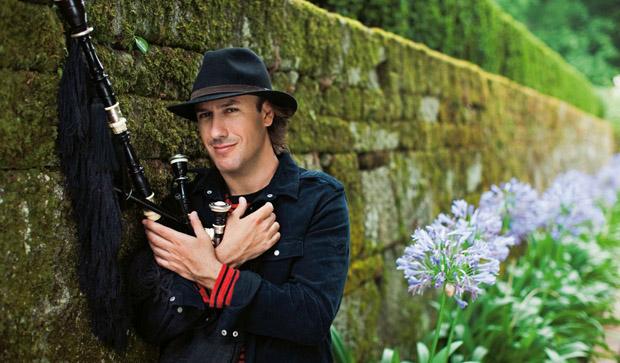‘The Seventh Chieftain’: Celtic Superstar Carlos Núñez
Carlos Núñez. (Photo: carlos-nunez.com)
When he was 8-years-old, Carlos Núñez started playing the bagpipes. The "Gaita," as the bagpipe is known in Galicia, opened a whole world of music around him.
"For me, the magical thing about the bagpipes, it was to discover that other countries, like Scotland, like Ireland, like the Bretons in France, all the Celtic countries, we play the same music but we speak different languages," Núñez says. "But the music makes us only one nation. I think Celtic music is a sort of Atlantic nation and we are part of the same family. I think this is what I really love it when I was a child."
Núñez says during the dictatorship of Generalissimo Franco, Galician music was forbidden — Celtic musicians could only play underground. After Franco died in the mid-1970s, there was an explosion of Galician music. Núñez says he's the direct result of this energy that had built-up over decades.
In the late 1980s, when he was still a boy, he met the masters of traditional Celtic music, The Chieftains.
"And I had the opportunity of start to play with The Chieftains when I was 13-years-old," Núñez says. "And with 18-years-old I was playing with The Chieftains and then they invite me to come to America. My first concert in America it was with The Chieftains in this tribute to The Who. Roger Daltrey, we played with Alice Cooper, with Sinéad O'Connor. Wow!"
Núñez launched his solo career, built on a long list of collaborations. He's played with artists as varied as Laurie Anderson, Ry Cooder, Compay Segundo, Ryuichi Sakamoto and Jordi Savall. But Núñez says it was The Chieftains who had the biggest impact on his life.
"They always said to me, 'Carlos, don't think in your little country, think international, think that the world is all connected and all the traditions are really the same, are really connected.' This is the idea The Chieftains gave me."
For his first album, "Brotherhood of Stars" Núñez invited musicians from all over the world. And at the suggestion of The Chieftains, he also invited musicians from Andalusía's flamenco world, to collaborate with musicians from the north of Spain. He says during the Franco dictatorship, Galician and Flamenco musicians never played or recorded music together.
"Never, ever. Because of the flamenco, it was the enemy for the music in the north," he says. "Think that for 50 years of dictatorship with Franco the Flamenco was the official music of Spain. The only possible music of Spain, the official Spain. And well, for us, the democracy was a liberation."
Today, Núñez says he's on a musical mission. He wants to explore the links between the music of Galicia, and by extension, the music of Spain, to the diverse musical cultures of Latin America and beyond.
"I think Latin America is like a cathedral with many traditions at the same time. So absolutely, I want to connect, to make all these connections, in the same way so many people as The Chieftains, Los Lobos, Linda Ronstadt, all those people. They gave me the opportunity of playing with them one day, and to learn."
Carlos Núñez just released a double CD, "Discover." And this week, he starts his first major tour of the US.
